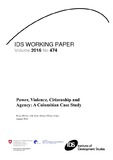| dc.contributor.author | McGee, Rosie | |
| dc.contributor.author | Alfonso Flórez López, Jesús | |
| dc.coverage.spatial | Colombia | en |
| dc.date.accessioned | 2016-08-08T08:22:57Z | |
| dc.date.available | 2016-08-08T08:22:57Z | |
| dc.date.issued | 2016-08-07 | |
| dc.identifier.isbn | 978 1 78118 324 3 | |
| dc.identifier.uri | https://opendocs.ids.ac.uk/opendocs/handle/20.500.12413/12139 | |
| dc.description.abstract | In a situation of longstanding and complex violent conflict in Buenaventura, Colombia, we
used action research to explore with social activists what power, violence, citizenship and
agency mean to them and how they experience and exercise citizen agency in relation to the
violence. This Working Paper presents our conceptual and theoretical starting points, action
research process and findings.
Direct violence was at a peak in urban Buenaventura when the action research was
conducted, manifest in some particularly macabre forms. Yet in exploring the
interconnections between power, violence and active citizenship, what emerged most
strongly were structural and symbolic violence. These are experienced by Buenaventura
citizens in ways that correspond to certain power theorists’ interpretations of ‘invisible power’.
Most citizens have yielded to the encroachment of violent norms, language and imaginaries,
allowing these to infuse their social roles and interactions and the socialisation of children
and youth.
The action research participants, however, represented a minority of active citizens who
respond differently to direct, structural and symbolic violence. They navigate it using a range
of responses: innovative organisational practices; mould-breaking models of social
leadership; the de-legitimation of violent actors, actions and attitudes; and other visible and
invisible expressions of individual and collective resistance to the violent re-shaping of
norms, beliefs and values.
The case study highlights the interconnected nature of direct, structural and symbolic forms
of violence; contributes to theorising invisible power from this grounded and richly contextual
perspective; illustrates the shortcomings of simplistic assumptions about citizen engagement
in fragile and violent contexts and the importance of ‘seeing like a citizen’; and sheds light on
debates about citizen agency and structuration in processes of social change. | en |
| dc.language.iso | en | en |
| dc.publisher | Institute of Development Studies | en |
| dc.relation.ispartofseries | IDS Working Paper;474 | |
| dc.rights | This publication is copyright, but may be reproduced by any method without fee for teaching or nonprofit purposes, but not for resale. Formal permission is required for all such uses, but normally will be granted immediately. For copying in any other circumstances, or for re-use in other publications, or for translation or adaptation, prior written permission must be obtained from the publisher and a fee may be payable. | en |
| dc.rights.uri | http://www.ids.ac.uk/files/dmfile/IDSOpenDocsStandardTermsOfUse.pdf | en |
| dc.subject | Politics and Power | en |
| dc.title | Power, Violence, Citizenship and Agency: A Colombian Case Study | en |
| dc.type | IDS Working Paper | en |
| dc.rights.holder | Institute of Development Studies | en |
| dc.identifier.team | Participation Power and Social Change | en |
| dcterms.dateAccepted | 2016-08-08 | |
| rioxxterms.funder | Default funder | en |
| rioxxterms.version | VoR | en |

